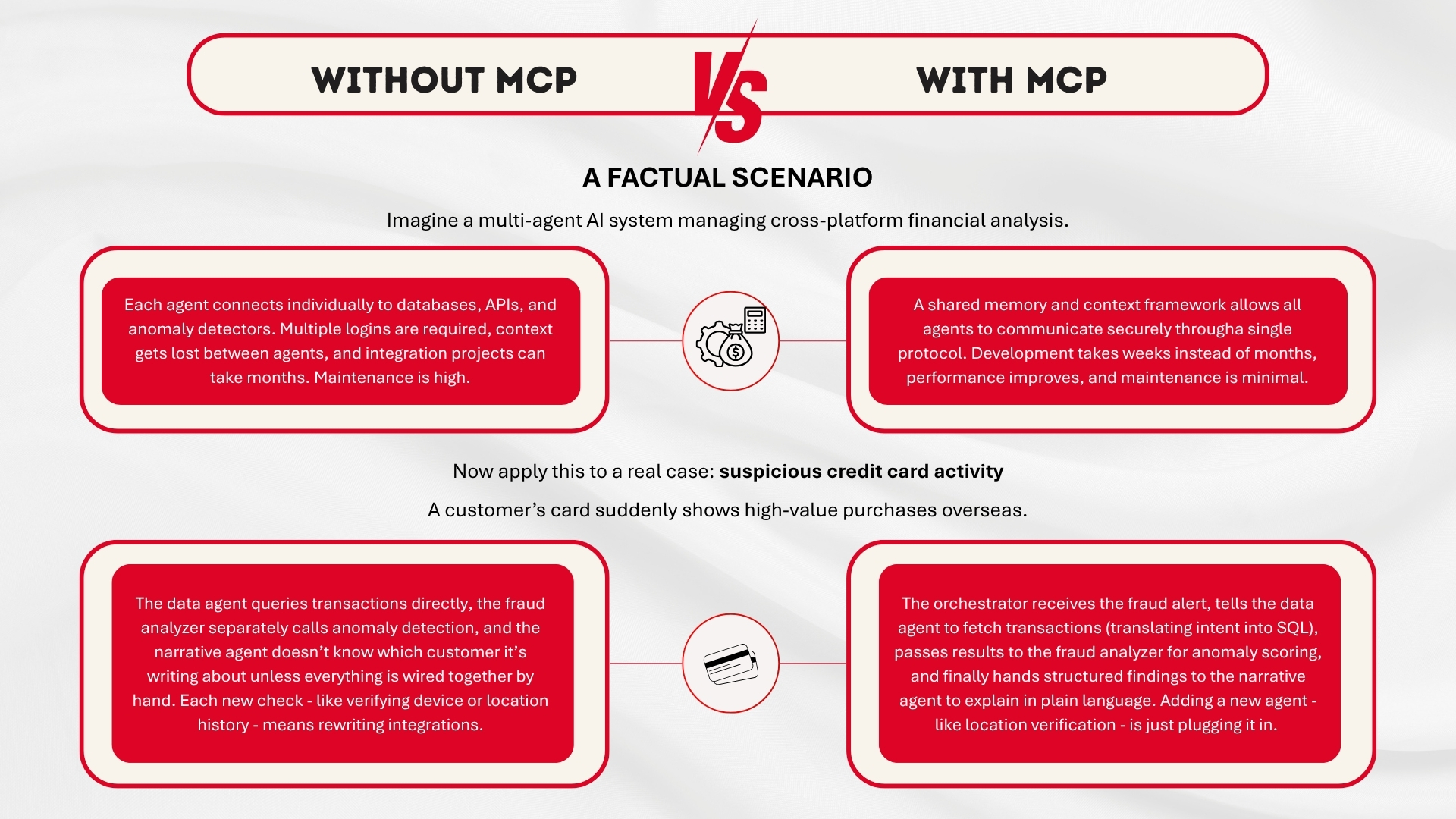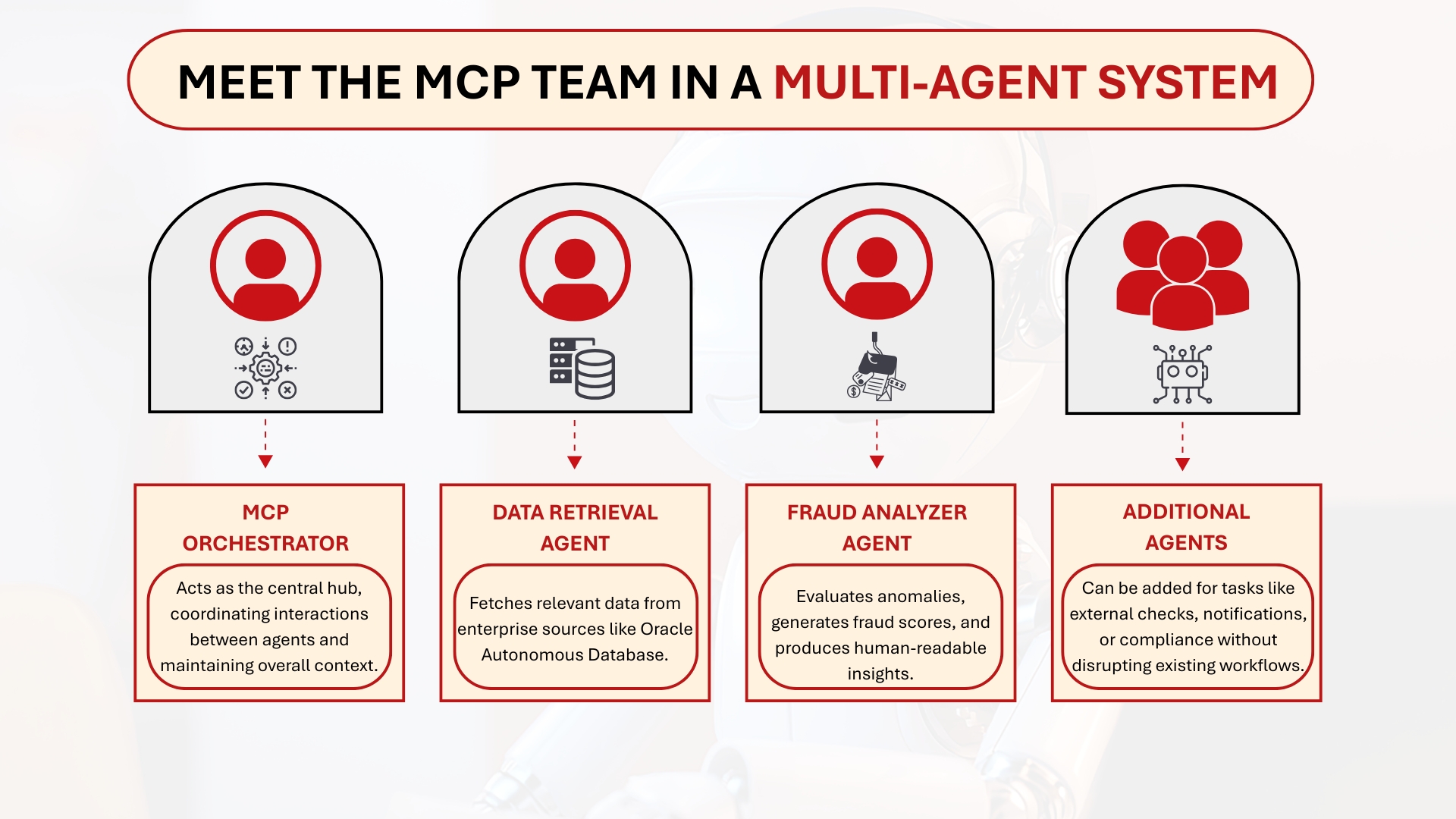Imagine a small-town restaurant where the staff knows every regular guest by name, remembers their favorite dishes, and even predicts what they might order next. They do this effortlessly because of shared context, memory, and familiarity. Now, imagine scaling that level of awareness to every app, service, and AI you use across the cloud, across devices, across platforms. That’s what Model Context Protocol (MCP) aims to do for artificial intelligence.



Agents are like detectives with specialties, while MCP is the lead investigator who assigns tasks, keeps the case file updated, and ensures everything is logged in the official language the systems understand. Without MCP, investigations turn messy and brittle. With MCP, they become smooth, coordinated, and enterprise ready.


With MCP, AI moves from isolated predictions to integrated, context-aware, multi-agent action — enabling a new level of intelligence and efficiency.
!pip install requests flask
Here, we simulate what an MCP server might do. We’ll:
from flask import Flask, request, jsonify import threading
app = Flask( name )
# Simulated inventory databaseINVENTORY = {
"Laptop": {"stock": 120, "location": "Warehouse A", "eta_days": 2},
"Smartphone": {"stock": 45, "location": "Warehouse B", "eta_days": 5}, "Headphones": {"stock": 200, "location": "Warehouse A", "eta_days": 1}
}
@app.route("/get_inventory_info", methods=["POST"]) def get_inventory_info():
data = request.json
product_name = data.get("product") if product_name in INVENTORY:
return jsonify({"status": "success", "data": INVENTORY[product_name]}) else:
return jsonify({"status": "error", "message": "Product not found"})
def run_server(): app.run(port=5000)
threading.Thread(target=run_server).start()
from flask import Flask, request, jsonify import threading
app = Flask( name )
# Simulated inventory database
INVENTORY = {
"Laptop": {"stock": 120, "location": "Warehouse A", "eta_days": 2},
"Smartphone": {"stock": 45, "location": "Warehouse B", "eta_days": 5}, "Headphones": {"stock": 200, "location": "Warehouse A", "eta_days": 1}
}
@app.route("/get_inventory_info", methods=["POST"]) def get_inventory_info():
data = request.json
product_name = data.get("product") if product_name in INVENTORY:
return jsonify({"status": "success", "data": INVENTORY[product_name]}) else:
return jsonify({"status": "error", "message": "Product not found"})
def run_server(): app.run(port=5000)
threading.Thread(target=run_server).start()
import requests
def mcp_fetch_inventory_info(product_name):
url = "http://127.0.0.1:5000/get_inventory_info"
response = requests.post(url, json={"product": product_name}) return response.json()
def ai_agent(query):
if "inventory" in query.lower() or "stock" in query.lower(): product_name = query.split("for")[-1].strip() product_data = mcp_fetch_inventory_info(product_name) if product_data["status"] == "success":
info = product_data["data"]
return (f"{product_name}: {info['stock']} units in stock at
{info['location']}, "
f"estimated delivery in {info['eta_days']} days.")
else:
return f"Sorry, I couldn't find info on {product_name}."
else:
return "I can only answer supply chain inventory-related questions right now."
print(ai_agent("Check inventory for Laptop")) print(ai_agent("Check stock for Tablet"))
import requests
def mcp_fetch_inventory_info(product_name):
url = "http://127.0.0.1:5000/get_inventory_info"
response = requests.post(url, json={"product": product_name}) return response.json()
def ai_agent(query):
if "inventory" in query.lower() or "stock" in query.lower(): product_name = query.split("for")[-1].strip() product_data = mcp_fetch_inventory_info(product_name) if product_data["status"] == "success":
info = product_data["data"]
return (f"{product_name}: {info['stock']} units in stock at
{info['location']}, "
f"estimated delivery in {info['eta_days']} days.")
else:
return f"Sorry, I couldn't find info on {product_name}."
else:
return "I can only answer supply chain inventory-related questions right now."
print(ai_agent("Check inventory for Laptop")) print(ai_agent("Check stock for Tablet"))
Without MCP:
# Without MCP: agent must know the data directly INVENTORY = {
"Laptop": {"stock": 120, "location": "Warehouse A", "eta_days": 2},
"Smartphone": {"stock": 45, "location": "Warehouse B", "eta_days": 5}, "Headphones": {"stock": 200, "location": "Warehouse A", "eta_days": 1}
}
def ai_agent_no_mcp(query):
if "inventory" in query.lower() or "stock" in query.lower(): product_name = query.split("for")[-1].strip()
if product_name in INVENTORY: info = INVENTORY[product_name]
return (f"{product_name}: {info['stock']} units in stock at
{info['location']}, "
f"estimated delivery in {info['eta_days']} days.")
else:
return f"Sorry, I couldn't find info on {product_name}."
else:
return "I can only answer supply chain inventory-related questions right now."
print(ai_agent_no_mcp("Check inventory for Laptop"))
print(ai_agent_no_mcp("Check stock for Tablet"))Output:
Laptop: 120 units in stock at Warehouse A, estimated delivery in 2 days.
Sorry, I couldn't find info on Tablet.
# Without MCP: agent must know the data directly INVENTORY = {
"Laptop": {"stock": 120, "location": "Warehouse A", "eta_days": 2},
"Smartphone": {"stock": 45, "location": "Warehouse B", "eta_days": 5}, "Headphones": {"stock": 200, "location": "Warehouse A", "eta_days": 1}
}
def ai_agent_no_mcp(query):
if "inventory" in query.lower() or "stock" in query.lower(): product_name = query.split("for")[-1].strip()
if product_name in INVENTORY: info = INVENTORY[product_name]
return (f"{product_name}: {info['stock']} units in stock at
{info['location']}, "
f"estimated delivery in {info['eta_days']} days.")
else:
return f"Sorry, I couldn't find info on {product_name}."
else:
return "I can only answer supply chain inventory-related questions right now."
print(ai_agent_no_mcp("Check inventory for Laptop"))
print(ai_agent_no_mcp("Check stock for Tablet"))
MCP turns a collection of independent AI agents into a cohesive, collaborative system. By managing shared context, translating high-level intents into actionable operations, and orchestrating communication between agents, MCP makes multi-agent AI scalable, maintainable, and reliable.
With MCP, agents don’t need to know where data lives or how to access it—they can focus on reasoning and decision-making. The result is a system that behaves like a skilled team with memory, coordination, and shared purpose, capable of tackling complex tasks efficiently and intelligently.
In short, MCP is the memory, translator, and coordinator that makes multi-agent AI practical and ready for real- world applications.
Public Security
Mineral Explore
Aerial Photography
Movie Production
Help Center
Ticket
FAQ
Contact
Community
Help Center
Ticket
FAQ
Contact
Community
[ninja_form id=2]